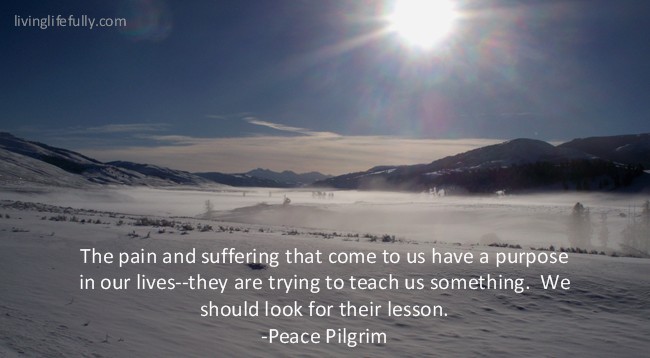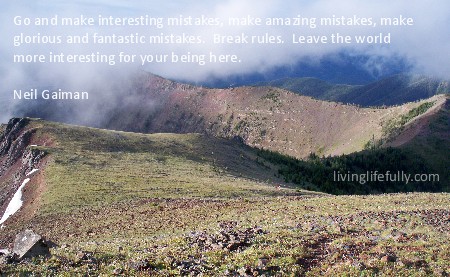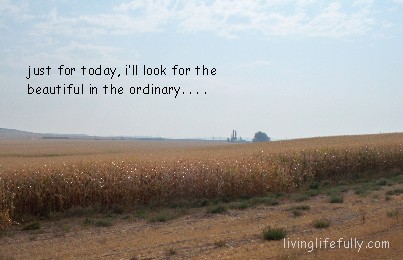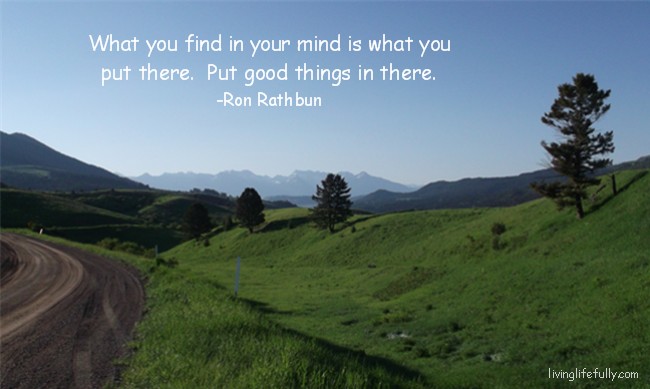|

29 November 2022
| |
|
|
| |
|
Simple and Profound
Thoughts
|
|
Acceptance
is a letting-go process. You let go of your
wishes
and demands that life can be different. It's a
conscious choice.
Gary
Emery
|
In
every adversity there lies
the seed of an equivalent advantage. In every defeat is a lesson
showing
you how to win the victory
next time.
Robert
Collier
|
|
Without an
awareness of our feelings we cannot experience
compassion. How can we
share the sufferings and the joys
of others if we cannot experience our
own?
Gary Zukav
|
That's
the thing with magic. You've got to know it's still here,
all around us, or it just stays invisible for you.
Charles
de Lint
|
|
| |
|

|
| |
How are
we doing? This address was given twenty-three years
ago on the occasion of the arrival of the new
millennium. How have we done over the past eighteen
years? Are we progressing, or regressing?
A Millennium Address
the Dalai Lama
Many people seem to be excited about the new millennium, but
the new millennium in itself will be nothing special.
As we enter into the new millennium things will be the
same; there will be nothing unusual. However,
if we really want the next millennium to be happier, more
peaceful and more harmonious for humankind we will have to
make the effort to make it so. This is in our hands,
but especially in the hands of the younger generation.
We
have had many experiences during this century-- constructive as well as extremely destructive ones.
We must learn from these experiences. We need
to approach the next millennium more holistically, with
more openness and farsightedness. If we are going to make
the right kind of efforts to make the future of the world
better, I believe the following matters are of great
importance.
1. While engaging in material progress and taking care of
physical wellbeing we need to pay equal attention to
developing peace of mind and thus taking care of the
internal aspect of our being.
|

|
2.
Along with education, which generally deals only with
academic accomplishments, we need to develop more altruism
and a sense of caring and responsibility for others in the
minds of the younger generation studying in various
educational institutions. This can be done without
necessarily involving religion. One could therefore
call this 'secular ethics', as it in fact consists of
basic human qualities such as kindness, compassion,
sincerity and honesty.
3.
This past century in some ways has been a century of war
and bloodshed. It has seen a year by year
increase in defense spending by most countries in the
world. If we are to change this trend we must
seriously consider the concept of non-violence, which is a
physical expression of compassion. In order to
make non-violence a reality we must first work on internal
disarmament and then proceed to work on external
disarmament. By internal disarmament I mean ridding
ourselves of all the negative emotions that result in
violence. External disarmament will also have to be
done gradually, step by step. We must first
work on the total abolishment of nuclear weapons and
gradually work up to total demilitarization throughout the
world. In the process of doing this we also
need to work towards stopping the arms trade, which is
still very widely practiced because it is so lucrative.
When we do all these things, we can then hope to see in
the next millennium a year by year decrease in the
military expenditure of the various nations and a gradual
working towards demilitarization. Human problems will, of
course, always remain - but the way to resolve them should
be through dialogue and discussion. The next
century should be a century of dialogue and discussion
rather than one of war and bloodshed.
4.
We need to address the issue of the gap between the rich
and the poor, both globally and nationally. This
inequality, with some sections of the human community
having abundance and others on the same planet going
hungry or even dying of starvation, is not only morally
wrong, but practically also a source of problems.
Equally important is the issue of freedom. As long
as there is no freedom in many parts of the world there
can be no real peace and in a sense no real freedom for
the rest of the world.
5,
For the sake of our future generations, we need to take
care of our earth and of our environment.
Environmental damage is often gradual and not easily
apparent and by the time we become aware of it, it is
generally too late. Since most of the major rivers
flowing into many parts of south-east Asia originate from
the Tibetan plateau, it will not be out of place to
mention here the crucial importance of taking care of the
environment in that area.
6.
Lastly, one of the greatest challenges today is the
population explosion. Unless we are able to tackle
this issue effectively we will be confronted with the
problem of the natural resources being inadequate for all
the human beings on this earth.
We
need to seriously look into these matters that concern us
all if we are to look forward to the future with some
hope.
January
1, 2000
|
|
| |
|

|
|
quotations
- contents
-
welcome
page
-
obstacles
the
people behind the words
-
our
current e-zine
-
articles
and excerpts
Daily
Meditations, Year One - Year
Two - Year Three
- Year Four
Sign up
for your free daily spiritual or general quotation ~ ~ Sign
up for your free daily meditation
|
| |
|
|
| |
|

|
We
have some
inspiring and motivational books that may interest you. Our main way of supporting this site is
through the sale of books, either physical copies
or digital copies for your Amazon Kindle (including the
online reader). All of the money that we earn
through them comes back to the site
in one way or another. Just click on the picture
to the left to visit our page of books, both fiction and
non-fiction! |
|
| |
|

|
| |
Persistent
Purpose
Orison Swett Marden
We hear a great deal of talk about genius, talent, luck, chance, cleverness, and fine manners playing a large part in one's success.
Leaving out luck and chance, all these elements are important factors.
Yet the possession of any or all of them, unaccompanied by a definite aim, a determined purpose, will not insure success.
People drift into business. They drift into society.
They drift into politics. They drift into what they fondly and but vainly imagine is religion.
If winds and tides are favorable, all is well; if not, all is wrong.
Stalker says: "Most people merely drift through life, and the work they do is determined by a hundred different circumstances; they might as well be doing anything else, or they would prefer to be doing nothing at all."
Yet whatever else may have been lacking in the giants of the race, the
people who have been conspicuously successful have all had one characteristic in common--doggedness and persistence of purpose.
It does not matter how clever youths may be, whether
they lead their class in college or outshines all the others
in his community, they will never succeed if they lack
this essential of determined persistence. Many
people who might have made brilliant musicians, artists, teachers, lawyers, able physicians or surgeons, in spite of predictions to the contrary, have fallen short of success because deficient in this quality.
Persistency of purpose is a power. It creates confidence in others.
Everybody believes in the determined person. When
they undertake anything their battle is half won, because not only
they themselves, but every one who knows them, believes that
they will accomplish whatever they set out to do.
People know that it is useless to oppose a person who uses stumbling-blocks as stepping-stones; who
is not afraid of defeat; who never, in spite of calumny or criticism, shrinks from
the task; who never shirks responsibility; who always
keeps their compass pointed to the north star of their
purpose, no matter what storms may rage about them.
The persistent person never stops to consider whether
they are succeeding or not. The only question with
them is how to push ahead, to get a little farther along, a little nearer
the goal. Whether it lead over mountains, rivers, or morasses,
they must reach it. Every other consideration is sacrificed to this one dominant purpose.
The success of a dull or average youth and the failure of a brilliant one is a constant surprise in American history.
But if the different cases are closely analyzed we shall find that the explanation lies in the staying power of the seemingly dull
person, the ability to stand firm as a rock under all circumstances, to allow nothing to divert
them from their purpose.
|
|
| |
|

|
|
Living
Life Fully, the e-zine
exists to try to provide for visitors of the world wide web a
place
of growth, peace, inspiration, and encouragement. Our
articles
are presented as thoughts of the authors--by no means do
we
mean to present them as ways that anyone has to live
life. Take
from them what you will, and disagree with
whatever you disagree
with--just know that they'll be here for you
each week. |
|
| |
|
To
speak truly, few adult persons can see nature. Most persons
do not see the sun. At least they have a very superficial seeing.
The sun illuminates only the eye of the adult, but shines into the
eye and heart of the child. The lover of nature is one whose inward
and outward senses are still truly adjusted to each other; who has
retained the spirit of infancy even into the era of adulthood.
Ralph Waldo Emerson
|
| |

|
Time
Today for Tomorrow
We read quite often in
inspirational literature that all we have is today--that
tomorrow and yesterday don't matter, because right here
and right now is all that matters. That's all fine
as a theory, of course, but what does it really
mean? After all, if I'm doing something important
tomorrow, there's a good chance that I have to plan for
it today. How, then, can I call tomorrow
unimportant? Perhaps what I'm doing today is a
result of preparations that I made yesterday--can I
really say that yesterday doesn't matter anymore, then?
I think that what we need to do is to shift our
perspective. So many of us get so focused on
tomorrow's job interview or presentation that we
sacrifice today--which is the only time that we really
have any influence over what happens to us. Today
I'm going to talk to people, to share with people, to
help people, to be helped by people--and if my mind is
on tomorrow, I'm not going to be able to share the
present with people today.
We've all had those times when we've been so focused on
what's going to happen this weekend that people will
have to force us back to the present. This happens
a lot with parents and kids--dad starts thinking about
Friday's deadline, while his daughter is saying,
"Look, Daddy!"
Too, often, Dad's response is "Not now,
honey. Maybe later." Not now--two words
that have caused millions of people to miss out on
sharing millions of beautiful experiences with loved
ones. But if not now, then when? Far too
often, those words end up meaning "Never,"
because the special time for sharing will have passed.
|
|
|
|
It
is something to be able to paint a particular picture,
or to carve
a statue, and so make a few objects beautiful;
but it is far more
glorious to carve and paint the very atmosphere
and medium through
which we look.
To affect the quality of the day--that is the
highest of arts.
Henry
David Thoreau
|
|
|
For example, I teach
five classes today. I've spent time preparing
for them--I spent a couple of hours yesterday and
the day before creating worksheets and quizzes, so I
don't need to worry about those. I've set
aside time tomorrow to prepare the worksheets for
Wednesday, so I don't have to worry about
those. I've done the readings and the grading
that I needed to do to be ready for today, so on
this day I can put my full attention and effort in
the present moment. I can give all that I have
to each class because I'm not going to need to worry
about the next class or the next few classes.
I've even started working on next week's tests so
that when the day for them comes, I'm ready and I
don't have to face extra stress that day.
But then we think, wait a minute--you are worrying
about tomorrow if you're preparing tomorrow's tests
today. And I would respond by saying that a
certain part of any today is spent preparing for
tomorrow or the next day or next week. We're
going back east to see my wife's family in March,
and we've already bought the tickets and reserved
the hotel. And one of the reasons that I like
to do such a thing so early is that if I don't, I'm
going to spend part of today wondering about how
much everything is going to cost, whether we're
going to get rooms in a good hotel, whether we'll
get good flights. Now that it's done, those
thoughts don't even enter my mind any more.
So some of today may end up being about tomorrow,
but it's usually not the case when I teach five
classes. I teach no classes tomorrow, so it's
much better for me to dedicate some time tomorrow to
Wednesday's classes--if I take an hour tomorrow to
get ready for Wednesday, then I can be fully present
at all times on Wednesday.
I don't ever want to have a student come to me for
help and have to tell them, "I can't help you
now because I'm getting ready for class in an
hour." After all, them coming to me for
help is one of my most important responsibilities.
|
|
|
|
See each morning
a world made anew, as if it were the
morning of the very first day; treasure and use it,
as if it were the final hour of the very last day.
Fay Hartzell Arnold
|
|
|
So today, I'm going to
be focused on today. I'm not going to worry
about who was absent last week, or what a particular
student did or didn't do two weeks ago because my
focus today is on the concepts and ideas that we've
prepared for today. I'm not going to tell my
wife that I can't talk to her because I didn't get
ready for today's classes and I'm stressed out
because I'm not sure what we're going to do because
I did dedicate some time in yesterday's today to
deal with that issue.
That doesn't mean that I've left everything I need
to do for today until today. Likewise, some of
the work that I do today may be preparation for
tomorrow, Friday, or next month. Today is a
special gift and I should take full advantage of
that gift by appreciating all that it has brought to
me, but some of what it has brought me is time that
I may use to free up a little time tomorrow when I
can go for a nice walk or relax for an hour and read
something fun and interesting.
Sometimes our most effective use of the time we've
been giving today is to plan and to ready ourselves
for tomorrow.
We have finals coming up, and I need to have tests
ready to go when the students show up for their
tests. Do I wait until the day of the final to
prepare them because that test is that day's
work? If I do that, I won't leave myself any
time for checking the accuracy of the test, for
proofreading, for making enough copies for
everyone. If I get those tests ready to go
today and tomorrow, it's true that I'm not able to
do certain things today, and one could say that I'm
losing out on what today offers because I'm focused
on the future. But when all is said and done,
the days of the tests will be much more positive and
fulfilling because of the work that I do today--if I
didn't do that work, I would be setting myself up
for some miserable days.
|
|
|
|
What
we are left with then is the present, the only time where
miracles happen.
We place the past and the future as well
into the hands of God. The biblical
statement that "time
shall be no more" means that we will one day live
fully
in the present, without obsessing about past or
future.
Marianne Williamson
|
|
|
This day is a special
gift. But the way that our world is
structured, the way that our lives fit into the
lives of everyone else, makes it important sometimes
to use this gift to prepare for the future, and not
just focus on the present moment. I'm a huge
proponent of being present in the moment and trying
to take advantage of all that the present moment has
to offer, but the realistic side to me says that
sometimes those offers must be put aside because we
need to prepare for something that's coming up.
The trick, of course, is to choose which offers we
pass up and which we don't. My preparations
for tomorrow can wait fifteen minutes if I have a
chance to talk to a young person. I can go to
bed a bit later if need be, but if someone asks me
for important advice on an urgent matter, I'll put
aside my plans for tomorrow rather than continue to
plan. This is one of the reasons for which
I've learned to start planning two weeks out rather
than two days out--something almost always will come
up that will make my plans moot, and that will push
my plans back a day or two. If I start early
enough, that kind of disruption will be easy to deal
with and won't cause me an inordinate amount of
stress.
So enjoy your day--get the most out of it that you
can. But remember that tomorrow will come no
matter how much we try to deny that it will, and
much of tomorrow's enjoyment may depend on today's
preparation.
|
|
More
on today.
|
|
|
|
|
| |
|

|
| |
|
HOME
- contents - Daily
Meditations - abundance - acceptance
- achievement
- action
- adversity
-
advertising
- aging - ambition
anger
- anticipation
- anxiety - apathy - appreciation -
arrogance
- art - attitude
- authenticity
- awakening - awareness
-
awe
balance - beauty
-
being yourself
- beliefs
- body
- brooding
- busyness - caring -
celebration
- challenges -
change - character
charity - children
-
choices
-
Christianity
- coincidence
- commitment
- common
sense
- community
- comparison - compassion
competition - complaining
- compliments -
compromise
- confidence - conformity
- conscience
-
contentment - control
- cooperation
courage -
covetousness
- creativity
- crisis - criticism
-
cruelty
- death
- decisions
- desire
- determination
- disappointment
discipline -
discouragement - diversity -
doubt - dreams
- earth - education -
ego - emotions -
encouragement
- enlightenment
enthusiasm - envy
- eternity
- ethics - example - exercise - experience - failure
-
faith
- fame
- family - fate - fathers
-
fault-finding
fear
- feelings - finances
- flowers - forgiveness
-
freedom
- friendship
- frustration - fun - the future
- garden of life - gardening
generosity -
gentleness
- giving
- goals - God
- goodness
- grace -
gratitude
- greatness
- greed
- grief - growing up
- guilt -
habit
happiness
- hatred
- healing
-
health -
heart
- helpfulness
- home - honesty
- hope
- hospitality - humility
- hurry
-
ideals - identity
idleness - idolatry
- ignorance
- illusion -
imagination - impatience
-
individuality
- the inner child - inspiration -
integrity - intimacy
introspection - intuition
- jealousy
- journey of life - joy
- judgment - karma - kindness
-
knowledge - language
- laughter
-
laziness
leadership
-
learning - letting
go - life
- listening - loneliness
- love
- lying - magic - marriage
-
materialism
- meanness
- meditation
mindfulness
- miracles
-
mistakes - mistrust
- moderation - money -
mothers
- motivation - music - mystery
- nature
-
negative
attitude
now -
oneness
- open-mindedness
- opportunity
-
optimism
-
pain - parenting - passion
- the past - patience
-
peace -
perfectionism
perseverance
- perspective - pessimism
- play
- poetry -
positive
thoughts
- possessions
-
potential - poverty -
power - praise
prayer
- prejudice
- pride - principle
- problems - progress
- prosperity
- purpose
- reading -recreation
- reflection
- relationships
religion
- reputation - resentment
-
respect - responsibility
- rest - revenge
-
risk - role models
- running -
ruts - sadness
-
safety
seasons of
life - self - self-love
-
self-pity
-
self-reliance - self-respect
- selfishness - serving others - shame
- silence
- simplicity
slowing
down - smiles
-solitude - sorrow -
spirit -
stories -
strength - stress
- stupidity
- success -
suffering - talent
the tapestry of life - teachers - thoughts
- time
- today - tolerance
-
traditions
-
trees
-
trust
- truth - unfulfilled
dreams
- values
vanity
- virtue
- vulnerability - walking - war
- wealth - weight
issues - wisdom
-
women -
wonder - work
-
worry - worship
youth
- spring - summer
- fall - winter
-
Christmas - Thanksgiving
-
New Year - America
-
Zen sayings -
articles
& excerpts
Native American
wisdom
-
The Law of Attraction -
obstacles to
living
life fully
- e-zine archives
-
quotations
contents
our most recent e-zine - Great
Thinkers - the people behind the words
|
| |
|
 ™ ™
|
|
All contents
© 2022 Living Life Fully™,
all rights reserved.
Please feel
free to re-use material from this site other than
copyrighted articles--
contact each author for permission to use those.
If you use material, it would be
greatly appreciated if you would provide credit and
a link back to the original
source, and let us know where the material is
published. Thank you. |
|
| |
|
The
only faculty by which we can bring the invisible near, is
the
imagination. Beyond that which the eye sees, beyond that
which
the ear hears, is a great region in which life is freer and
more
transcendently glorious than this. The imagination in us
finds its field in trying to grasp that great fact.
Reuen Thomas
|

|
|
| |
|
Imagination
is a flame that ignites the creative spirit.
Imagination lights up your mind by stoking mental
fires. It can be stimulated from the outside
through the senses, or from the inside through the
driving power of curiosity and discontent.
Imagination
stimulates your thinking power by giving your mind
abundant data with which to work. It opens the
gate to dreams and fantasies so that you may become
receptive, as a little child, in exploring the
Kingdom of Ideas.
Imagination
guides you in your contacts with individuals and
crowds, so you can discover new concepts and
approaches.
Imagination
inspires you to look at everything with fresh eyes,
as though you had just come forth from a dark tunnel
into the light of day. Imagination becomes for
you a magic lamp with which to search the darkness
of the unknown, that you may discover new goals or
chart more productive paths to old goals.
Imagination
helps you to recognize the reality of facts, but
then to go beyond them, to penetrate beneath them,
to rise above them in your search for creative
answers to problems. Imagination "stirs
up the gift of God in thee." Through your
imagination you touch and express the inspiration of
the Infinite. Imagination, in the words of
Shakespeare, "gives to airy nothing a local
habitation and a name." You reach into
the heavens to grasp an idea, then you bring it down
to earth and make it work.
Wilferd
A. Peterson
|
|
| |
|
|

|
| |
|
Our
interdependence with others is the most encompassing
fact of human
reality--our personalities are made by our
contacts with others. There
is, therefore, a duty
which falls upon all of us--to become free,
loving,
warm, cooperative, affirmative personalities.
Joshua Loth Liebman
|
| |
|
